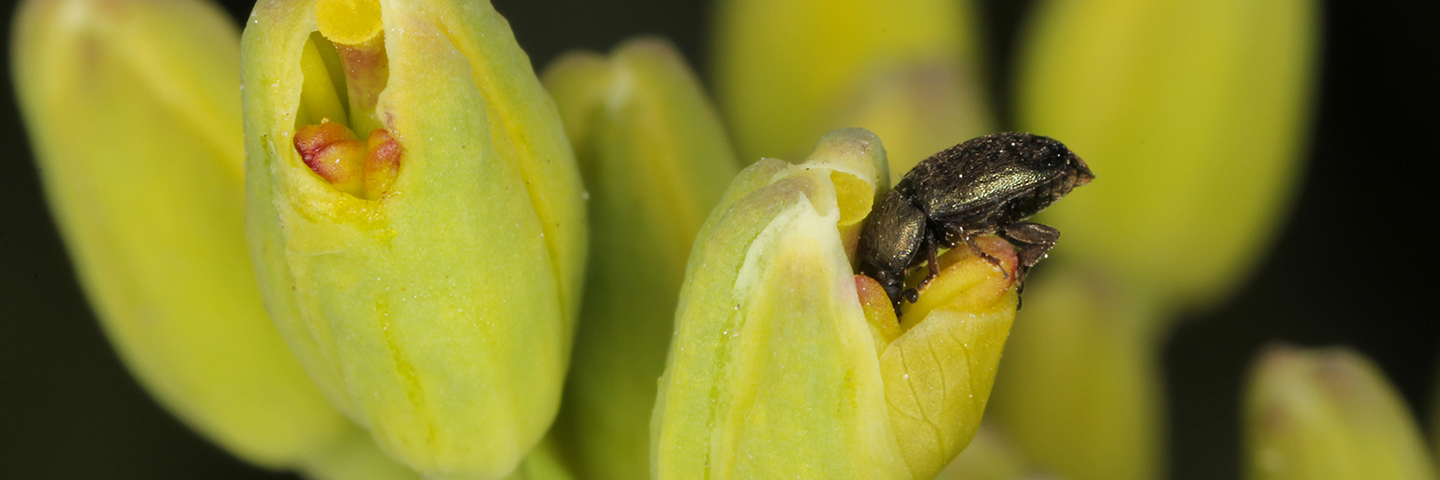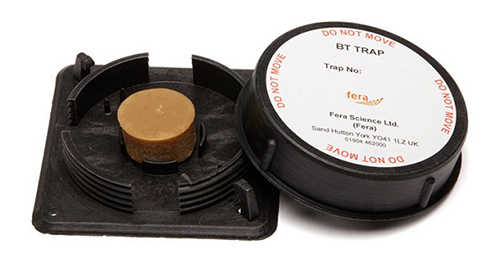
Visit our other sites
-
Fapas - Proficiency Testing
Globally recognised provider of proficiency tests, running over 400 tests annually across an extensive range of matrices and analytes
-
Great Crested Newts Testing
A single sample taken by an ecologist at any time during the newt breeding season can determine their presence or absence, saving you time and money
- The Fera insect monitoring service helps growers to target insecticide applications more accurately to reduce costs and waste, optimise resources and improve yields.
- Contact Us



Yellow Water Traps
Simply complete an order form and we will send you all the equipment required, including water trap, sample pots and return envelopes. It takes just a few minutes to collect the sample.
For more information, please get in touch.
Understanding the risks to your crops allows you to make informed decisions on when to treat your crops and to be more targeted with your pest management.
Fera's in-field Insect Monitoring Service helps potato, salad, carrot and winter oil seed rape growers to increase yield whilst reducing costs. Our Insect Monitoring Service can be used by growers across the UK to mitigate risks with a more targeted approach to pest management.

-
Demonstrate good quality and environmental management to customers.
-
Save time and money with more targeted insecticide applications.
-
Optimise resources and increase crop yield and quality.
-
Target crop management to reduce virus transmission and insecticide resistance.

Risks to Oilseed rape (OSR)
Each year up to 76% of the OSR crop is affected by cabbage stem flea beetle damage. The crop is most vulnerable to adult CSFB damage at the early stages of emergence as the beetles can feed on and destroy the growing point of the plant.
Crops drilled into dry soil conditions can cause the newly drilled crop to emerge slower and thus be more susceptible to crop damage from this pest. If the damage is severe, the seedlings can be affected even before they emerge. The overall effects cause stunting of the plant, poor plant vigour and in some cases total plant loss.
There is some confirmation of pyrethroid resistant CSFB populations now being present in the UK. Monitoring must now be a key component in Integrated Pest Management for UK growers of oilseeds.
Risks to salad crops
Salad growers in the UK face challenges from damage caused to their crops by the transmission of viruses from aphids and from insect feeding damage. There is also additional risk of reputational damage to growers if the final product is found to contain insects. These challenges are having a significant impact across the industry leading to AHDB including the control of insect pests as one of the priority areas in their Leafy Salads Strategy.
Aphid transmitted viruses and feeding damage have a significant impact on the industry. Insects found in the final product can lead to reputation damage as customers demand perfection from purchased produce.
Fera's Insect Monitoring Service can identify the species of aphids present in crops alerting growers to which viruses their crops are at risk from. They also highlight when further visual inspections are required to identify infestations and prevent reputational damage.


Risks to seed potatoes and vegetables
Potato viruses Y and A (PVY and PVA) are serious threats to the quality of seed potatoes. About 40 aphid species transmit PVY and PVA with varying efficiency. The presence of aphids and aphid virus transmission are also a problem for vegetable and salad growers. Aphid-transmitted viruses can be particularly problematic in carrot crops.
Monitoring also help you assess the risk of spread of PVY, and you can take this into account when considering the best time to burn down your crop, maximising your yield without risking the virus health of the seed. Gathering information on the potential quality of home saved seed gives you the opportunity to avoid the expense involved in buying-in classified seed potatoes.
Fera's Insect Monitoring Service uses yellow
water traps to attract aphids which you then send to us for analysis, allowing
us to tell you which species are present in the field and if your potato crop
is at risk.
We also provide the national yellow water trap aphid monitoring
programme for AHDB-Potatoes.
Insect monitoring services inform better decision-making
By using our insect monitoring services to assess potential virus-transmitting aphids and CSFB adults flying into crops in autumn, you can make well-informed decisions about when to spray your crops. We supply complete yellow water trap kits for you to use, providing results quickly so you can make timely agronomic decisions including how and when to treat your crop.
Aphid Monitoring
The Aphid Monitoring service provides information specifically for your field to assess the risk of virus transmission, enabling better targeting of aphicide applications and other crop management interventions.
Insect monitoring provides you with the information you need to assess the risk of virus transmission specifically for your field. You can use this information in a number of ways to help you to reduce virus transmission and increase the value of your crop:
Money & time efficiency
Reduce and better target aphicide applications saving you money and time.
Effective management
Demonstrate good management practices helping you meet your customers' needs.
Crop preservations
Optimally time haulm destruction to preserve the value of your crop.


Profit maximisation
Assess the potential of home-saved seed potatoes and maximise profit the following year.
Strategic inputs
Fast results for targeted inputs.
Providing necessary equipment
We send you all the equipment that is needed, including water trap, sample pots and return envelopes. It takes just a few minutes to collect the sample. Your results, including a cumulative risk index, are sent to you by email or fax - your choice. You will receive your results the same day we receive your sample. Costs per site are around £526 for a ten week growing season.
UK & European successes
Seed potato growers, carrot growers and salad growers in the UK and Europe are benefiting from our service year after year by making decisions based on results for their own fields.
Insect Monitoring Order Forms
There are specific aphid monitoring order forms for some crops: Cereals & Salads, Oilseed Rape (OSR), Carrots and Parsnips. Aphid monitoring in potatoes can be ordered via our web shop. For monitoring in other crops please contact us to discuss.
Please note that samples cannot be processed until we have received a completed and signed order form.
Fera's Mite Trap and Monitoring Service
Fera's Mite Trap is specifically designed and developed for monitoring storage mite pests. The robust trap contains an attractant made from non-toxic ingredients which attracts live mites and other storage pests and provides early indications of problem areas, pinpointing hidden infestations and refuges, thus giving you the opportunity to target remedial treatments and resources for best effect.
We will work with you to tailor our services to meet your mite monitoring requirements. Our service helps to support UFAS accreditation (Universal Feed Assurance Scheme) as well as help you to protect your brand's reputation.


Fera’s Flotation Test
The Flotation Test can identify contaminating matter of animal origin (e.g. whole or fragmented mites and insects, or rodent hairs) in a wide range of food, feed, veterinary and dust samples. It is the single and most effective method of confirming the presence of mites in commodities, and easily differentiates between dead and live mites.
Fera’s Bespoke Packaging Tests
Fera can also offer bespoke packaging penetration tests to help mitigate risks of infestation. The tests consider the nature of your product, the form of packaging, storage conditions and length of time in storage, with a range of potential pests.

Why choose Fera?
-
The UK's largest Plant Clinic
We are the UK's largest Plant Clinic handling in excess of 40,000 samples a year, offering the most comprehensive range of testing services for all sectors throughout the supply chain.
-
State of the art approaches
We use a combination of state of the art LC-MS/MS triple quadrupole instruments; radiochemistry and test item application techniques to ensure that experimental studies generate relevant and valid outputs.
-
Decades of experience
More than 100 years experience of delivering pest and disease identification services to a wide range of commercial growers and Government departments, both in the UK and overseas.
-
Immense capabilities
We have the capacity to deliver with 4km of lab benching and 350 scientists analysing over 100,000 samples per year.

Hear from our Entomology team
Driving Innovation in Entomology Through Interdisciplinary Collaboration
In this video, Dr. Larissa Collins, Entomologist, outlines the work of our entomology team and discusses the importance of interdisciplinary cooperation in pursuing innovation.

Invertebrate Pests & Novel Control
Our world-leading research provides practical solutions to the key pest challenges facing the agriculture, horticulture and forestry industries. Our expertise can assist you from early stage pre-commercialisation research, through the preparation of registration dossiers, to product stewardship. Our unique selling point stems from our interdisciplinary approaches and access to specialist facilities that ensure that our customers achieve the required solutions.
Major customers include Defra, Levy bodies, other government departments and the European Commission. We also undertake bespoke studies and services for commercial customers.
Examples of our services
Development of novel control methods for invertebrate pests: Research and development into novel pesticide targets and delivery systems, including hormones and receptors, parasitic wasp venoms, enhanced biological control by immune suppression, modifying reproductive behaviour, fusion proteins for enhanced oral uptake, novel toxins and RNA-interference (RNAi).
Development and assessment of new chemical and biological pesticides: Efficacy evaluation and development of delivery systems for insecticides, acaricides, molluscicides and adjuvants, to provide advice both for further product research and development and registration requirements.
Development of integrated pest management strategies for UK, European
and invasive pest species: Integrated pest management (IPM) strategies against
both indigenous and non-indigenous pests of agriculture, horticulture, tree and
bee health importance, including improved monitoring, seasonal monitoring,
biopesticides, evaluation of non-chemical control techniques, natural enemies and
ecosystem management.
Mite services and nuisance insects: Research and development, commercial
monitoring services and strategic advice covering a range of mite-borne insect
nuisance problems, including storage and allergenic mites of food processing, stored
products, animal feed stocks and habitation. Also includes nuisance insects in
relation to environmental legislation and research and development into
parasitic mite disease of sheep and cattle.
Biology and Behaviour: Understanding the biology and behaviour of key
invertebrate pest species to advise policy and control strategies
Ecotoxicology and environmental fate studies: Fera has extensive experience in
understanding the environmental movement of pesticides and the assessment of
aquatic, terrestrial and bee ecotoxicology.
Operator and by-stander exposure.


